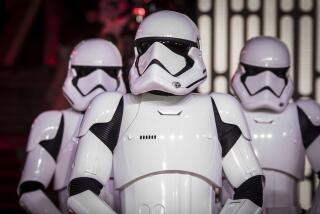Review: Patrick Stewart will thrill you in ‘Star Trek: Picard’
In our era, Earthdate 2020, there are two long-running franchises based in space. One of them is smart and ambitious, driven by character and ideas.
The other is “Star Wars.”
“Star Trek” first beamed into cultural consciousness in 1966, charting the voyages of the Starship Enterprise as its multicultural, multi-planetary crew boldly went from social metaphor to metaphor, from prejudice to pacifism — it was designed from the beginning to explore contemporary issues. The franchise, through its various spinoffs and big screen variations, has not been immune to unintentional self-parody, nor afraid to indulge in the intentional kind. (It is the model “Galaxy Quest” lovingly takes apart.) And its science can be, as Spock might say, illogical: I’m looking at you, holodeck. But it was serious about people, our place in the cosmos, our possibilities and limitations and interpersonal relations, and the vision of a future we might not mangle as badly as the present.
The Pulitzer-winning ‘Adventures of Kavalier & Clay’ novelist talks about his new job: showrunner on CBS All Access’ ‘Star Trek: Picard.’
The second live-action series in the canon, and the most highly rated, was “Star Trek: The Next Generation,” a.k.a. “TNG,” which ran in syndication from 1987 to 1994 and spawned its own series of big-screen sequels. Now, 18 years after the last of those, its captain has been made the titular hero of “Star Trek: Picard,” which premieres Thursday on the premium streaming platform CBS All Access — already home to the prequel “Star Trek: Discovery” — with Patrick Stewart picking up the thread of his old role. On the basis of the three episodes out for review, it promises to be a satisfying voyage.
“I never really cared for science fiction,” Picard tells a visitor thumbing his copy of the Isaac Asimov collection “The Complete Robot.” “I guess I just didn’t get it.” But it can be hard to see things from the inside.
A friendship is at the heart of “Picard,” though one of the parties is long since gone: the android Data (Brent Spiner, guesting for the space of a couple of dream sequences), who sacrificed himself to save Picard in the last “TNG” film, the 2002 “Star Trek: Nemesis.” As we open here, at the end of the 24th century — in this hopeful timeline, we have lasted that long — Picard, “retired” from Starfleet with the rank of admiral, is earthbound, living on his vineyard estate with a couple of Romulan assistants, who seem more like family, and a dog named Number One.
Without giving a complicated plot away, it’s Picard’s love for Data that leads him to take seriously the remarkable claims of Dahj (Isa Briones), a young woman who survives an attack by what will later be described as a “Romulan death squad” and shows up unannounced on Picard’s doorstop asking for help. (Imminent danger has unlocked some unexpected latent abilities — that old trope.) In due course, the erstwhile captain of the Enterprise will admit to himself that he is not made for the life of the soil: Space is the place for him.
We learn before long that the 14 years he has spent making wine, writing history books and walking his dog have not been a contented retirement, but a forced retreat. Picard, for his part, has lost faith in the institutions to which he devoted his life — “I never dreamed that Starfleet would give into intolerance and fear,” he says, in a flashback, of the events that parted their ways. For their part, his old employers regard him as “a once-great man, desperate to matter.”
Stewart is 79, and except in flashback scenes, there is not much interest in pretending he isn’t; a stunt double is employed when required, but no attempt has been made to turn Picard into an action hero. Fleeing trouble, he struggles with stairs; he gets winded. He takes his tea decaf. There are younger cast members to do the heavy lifting and running about, of which there is more than a little, but not too much.
But age is an issue here, unavoidably — “Sometimes you talk to me as if I were a benign old codger,” Picard complains to one of his helpmates — and there is an elegiac sweetness to Stewart’s performance that colors the series as a whole, and makes the suspense effective. (There are, of course, enemies of this sweetness.) You tremble, because you care.
The venerable space saga has enjoyed many incarnations on screens big and small.
Guided by Michael Chabon and Akiva Goldsman, “Picard” doesn’t break the mold. (Fitting the mold is more the point.) The story of an aged lion going once more into battle is a familiar one, although given that the series has already been granted a second season, this will not be Picard’s final frontier. Neither is this the first time in fiction that a ragtag team of refugees and rebels join forces in a way they are yet to understand.
That company here includes Dr. Agnes Jurati (Alison Pill), who knows something important about androids and has my favorite line in the series’ opening gambit: “People in the synthetic humanoid field tend to get a little secret plan-y.” Raffi Musiker (Michelle Hurd) is a former Starfleet officer whose career went down with Picard’s — for which she blames him, and also for not calling in the meantime. Rogue pilot Chris Rios (Santiago Cabrera), another Starfleet castoff, is the Han Solo of the piece, though one who reads 20th century Spanish philosophy.
“Star Trek” is back, you may have heard on your subspace communicator, in the shape of a television series for the first time since “Enterprise” completed its four-year mission in 2005.
Old hands joining them on one deck or another in the 10-episode first season include Jeri Ryan as former Borg drone Seven of Nine; Jonathan Frakes as William Riker, Picard’s old first mate; and Marina Sirtis as counselor Deanna Troi, who, when last seen, was getting hitched to Riker.
Given that the new “Star Trek” series are the reason many will have subscribed to CBS All Access in the first place, much of the audience will be conversant with this universe. They’ll recognize the recording of “Blue Skies” that plays over the series’ opening moments as a callback to the last “TNG” film, “Star Trek: Nemesis.” They will know the meaning of the literally huge surprise that arrives at the end of Episode 1. But familiarity is not essential, and when Picard finally gets his funky little starship and skeleton crew and pronounces the word “Engage,” anyone with an ounce of romance in them should feel that thrill.
‘Star Trek: Picard’
Where: CBS All Access
When: Anytime, new episodes available Thursdays
Rating: TV-PG (may be unsuitable for young children)
More to Read
The complete guide to home viewing
Get Screen Gab for everything about the TV shows and streaming movies everyone’s talking about.
You may occasionally receive promotional content from the Los Angeles Times.








